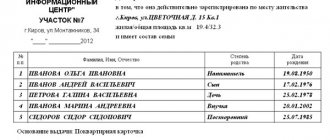For Russians, the process called “privatization” is of great importance. Everyone knows that it is privatization that gives a citizen of the Russian Federation the opportunity to obtain an apartment that was once rented from the state as personal property. Citizens prefer to prepare for this important process in advance in order to take everything into account and avoid a number of difficulties and problems. But there are times in life when the need for the privatization process can arise suddenly and extremely acutely. It is in such situations, which can rightly be called “peak”, that many pressing issues arise “in full force.” And one of the most pressing questions that arises when carrying out urgent privatization is the question of whether it is possible to privatize an apartment with a debt to pay for utilities? Unfortunately, we must admit that this particular issue is very relevant for many people. We propose to discuss this topic in detail and understand: will such design of an apartment be legal? Is it possible to get a refusal during “debt” privatization, and what are the reasons for the refusal? Let's discuss the list of documents and find out where they should be submitted. Let's talk about going to court and selling a privatized apartment with debts.
From a legal point of view
First of all, we propose to determine the content of the privatization process. Privatization is the only available method of converting public housing (municipal) into private ownership (property).
The law allows literally every citizen who has a residence permit to use their privatization right in an apartment that is rented on the basis of a social tenancy agreement. The legislation allows privatization to be carried out free of charge no more than once. Upon completion of this process, a person becomes a private owner of property in the form of an apartment. But what to do if the privatized housing has utility debts?
In answering this question, let’s turn to the law and find out its “point of view.” In Russia there is a separate law regulating the privatization process and it is appropriately called . ” This law is not supplemented by any regulations regarding utility debts.
Important! Accordingly, we can safely say that at the legislative level, there are no prohibitions for the implementation of the privatization process.
The only thing you need to know is that every resident of Russia has the right to free privatization of housing only once in their life. Further, this procedure will cost money. An exception is the situation in which a citizen took part in privatization before he came of age. Then, having matured, a person has the right to another free privatization.
Definition
First, let's try to find out what procedure we are talking about. What is privatization?
This is the name given to the process of re-registration of state property (most often housing) into private ownership. During the operation, the residents registered in the apartment become its full owners. In Russia, free privatization is possible once in a lifetime. But there are exceptions. These are cases of privatization of housing with a minor child. Children under 14 years old are required to participate in the process. Therefore, they retain the right to free privatization after reaching adulthood.
Duty and opportunity under the law
To the question of whether it is possible to privatize housing with housing and communal services debts, the law answers in the affirmative.
This means that municipal authorities have no right to refuse a citizen privatization.
Note! At absolutely any time, the person registered in the apartment has the right to begin processing papers for privatization. At the same time, utility debts cannot serve as at least some obstacle to the privatization of an apartment.
Don't have time to read the article?
Get an initial consultation from several companies for free
: fill out an application and the system will select suitable companies!
138 companies are connected to this service
Start selection in a few clicks >
It is at the stage of collecting certificates that you may encounter problems if your utilities have not been paid. They will simply refuse to issue you certificates, despite the fact that this will be a violation of articles of two laws at once - Federal Law No. 152-F1 and Federal Law No. 149-F3.
In principle, such behavior on the part of municipal employees can be understood. Sometimes this is the only opportunity to collect at least some part of utility payments from debtors. But refusal to issue certificates before paying utility bills is too categorical a measure. In fact, you cannot be denied privatization, citing arrears in payment of utility services, but the absence of one of the certificates can become a serious obstacle.
If you are denied certificates, you have the right to contact the prosecutor's office and the State Housing Inspectorate. Article 19.1 of the Code of Administrative Offenses regards this as arbitrariness. First, just threaten - most likely, after that your request will still be considered. If ordinary employees refuse you, contact their superiors. Usually this works, but sometimes you still have to contact the relevant authorities.
When reality and law do not intersect
It should be recognized that in reality everything happens exactly the opposite: the law says one thing, but local officials say something completely different. Unfortunately, such an “author’s” reading of the federal law is no exception for Russia, especially when it comes to municipalities and small towns. Many laws are openly ignored by local officials, turning the lives of ordinary people into a “struggle for survival.”
According to current practice, the presence of debt for utility services is a serious problem for the ability to privatize housing.
Keep in mind! The problem is that the list of documents required for privatization includes certificates of forms 7 and 9 . These certificates are issued only by management companies, housing offices and passport offices. Therefore, if there is a fact of debt for housing and communal services, a person simply will not be able to obtain the necessary certificate: he will be refused to issue it, up to the full payment of the debt.
According to the current legislation, which we discussed above, such actions are illegal and unacceptable. Therefore, the current situation is ambiguous and problematic, and every person, taking this into account, should know how he can exercise his rights if he has a rent debt.
Is privatization possible with debts?
There are no official obstacles to the privatization of an apartment with debts. This is due to the fact that this issue is not specified in the law. In practice, however, citizens face many problems in this regard.
Typically, authorized bodies create a lot of obstacles to obtaining the necessary documents, citing debts that have not been paid.
In this situation, they act unlawfully and may be subject to administrative liability.
What are the conditions?
The conditions are similar to those that exist when privatizing an apartment without debt. In particular, citizens who live in a municipal apartment under a social tenancy agreement have the right to privatize housing.
They cannot privatize:
- persons who are in the apartment on a rental basis;
- registered in housing on a temporary basis;
- previously involved in privatization.
How privatization is carried out in military camps can be found in the article: military privatization in 2020. If you are interested in the question of how to obtain a privatization certificate, read here.
By rent
If there are debts associated with the provision of public services, it is not necessary to pay for them through privatization.
But problems may arise at the passport office, where a citizen needs to obtain certificates in forms 7 and . They are included in the list of documents for privatization; without them, an application from a person for privatization will not be accepted.
Passport office employees do not issue these certificates, arguing that the refusal is due to the need to pre-pay the debt. But this request has no real justification, since the law does not say anything about this.
In this case, you need to ask the employee for the reasons for the refusal. But no one will refuse in writing. An option for a citizen is to contact the prosecutor’s office in order to protect their legal rights.
What is the procedure
It is worth deciding who will go through all the authorities. Privatization is a rather time-consuming process. You can do it yourself, being prepared to devote a lot of time to it.
In addition, you can contact specialists who will help privatize housing, especially if there are problems with this process.
To do this you need to issue a power of attorney. The indisputable advantage of this method is the speed of action of specialists. The downside is the high payment for services.
What will it take?
Initial list of documents:
- Housing order.
- Extract from the house register.
- Housing passport (cadastral).
- The main document of persons participating in privatization.
- Birth certificates.
- Passport (technical).
- Social tenancy agreement.
In the process of collecting documents, a citizen will be faced with the fact that the passport office employees will not want to issue the citizen with certificates of forms 7 and 9.
Despite the fact that the law regulating the privatization process in Russia says nothing about a citizen’s debts, if possible, it is better to pay all debts.
This will help save nerves and time spent on finding out the reasons for the debt, its size, and appeals to the relevant authorities for the protection of violated rights.
If the debt cannot be paid, the citizen can take the following actions:
| Indicators | Description |
| If the debt is small, then no additional questions should arise for the participants in the privatization process | but public utilities that provide the corresponding services can sue a citizen because he does not pay for them. You go to court if you have accumulated debt for 6 months. In addition, social tenancy agreements can be terminated with the debtor-tenant. The question of privatization will disappear |
| Article 391 of the Civil Code of the Russian Federation establishes that the debtor can transfer the debt to another person, but only on condition that the creditor agrees to this | in this situation, the lender pours out housing and communal services. Based on this, an agreement can be drawn up under which the debt is transferred. After the agreement is concluded, an extract from the personal account about the status of the debt should be given without any problems |
| If the answer is negative, it must be in writing. | with such a refusal it is necessary to go to court |
Can the procedure be refused?
State and municipal authorities that refuse privatization do not have the right to do this without having any grounds for a negative answer.
The law does not prohibit citizens from privatizing an apartment with debts; therefore, refusals by authorized bodies should be dealt with in the prosecutor’s office.
The prosecutor's office is a state body designed to monitor compliance with the law throughout the Russian Federation. Russians who believe that their rights have been violated have the right to contact the Prosecutor's Office.
This situation can be observed in many spheres of society, including illegal refusal in the privatization process.
In addition to the Prosecutor's Office, you can protect your rights directly in court. In the process of going through the authorities, some of them may require a certificate of no debt.
If, due to the lack of these certificates, it is not possible to collect all the documents for privatization, then the actions of the competent authorities can be appealed in court.
It should be understood that the rent debt belongs to the person who lived in the apartment.
If the apartment can be privatized and then sold, the debt will not pass to the new owner. He will remain with the previous occupant.
Thus, in practice, it turns out that when submitting documents for privatization, the competent authorities may require a certificate stating that utilities have been paid.
But the absence of a receipt cannot affect the privatization process. If the registration authority does not understand this, the citizen should seek clarification from the court.
Video: privatization of an apartment with debt
Privatization in step-by-step execution
In fact, there is nothing complicated or impossible in implementing the privatization process. For clarity and speed of the process, it is necessary to understand the “step-by-step route” and confidently follow it.
As we have already found out, having rent debt can make this process very difficult, but generally speaking, the algorithm for turning municipal housing into your own housing is as follows:
- Make a decision about who will privatize the apartment. The fact is that not all residents want this. Such objectors must write their refusal of privatization in writing.
- Contact the BTI to obtain the necessary certificates.
- Contact the body that owns the housing (the municipality) and get the missing papers.
- Having collected the entire documentary package, contact the chosen authority to carry out privatization. As a rule, this is the city administration.
- Pay the state fee for privatization.
- After waiting for a positive response from the city administration, you need to contact Rosreestr and issue a certificate of ownership there.
Privatization procedure
As a rule, the city administration deals with housing privatization issues. When contacting this authority, it is important to pay a small fee and wait for the appropriate decision. Next, use the registry to obtain a certificate of ownership.
If the property has many co-owners, but all of them cannot handle the paperwork, you need to delegate this responsibility to one person using a power of attorney, which allows you to represent the interests of the others. Another option is agencies specially created to help citizens prepare various documents.
Privatization of an apartment with a rent debt is carried out on the basis of citizens' documents - their passports, refusals and consents of residents (if any), a power of attorney (if it was issued), a technical passport and an extract from the BTI, a cadastral file, a certificate indicating that these citizens have not yet exercised the right to receive square meters in ownership, a housing order, a social tenancy agreement, a certificate of personal account of the home, a birth (marriage) certificate, a court decision on divorce and extracts from the house register. Depending on the type of property, the list may be shortened.
We suggest you read: Vacation starts on a day off
Privatization with debts is not prohibited in the Russian Federation, and if it is refused, the decision can be appealed legally. These issues are within the competence of the Magistrates' Courts, and the process itself takes about 2 weeks. The basis for going to court is a refusal to privatize, issued by the relevant authority.
But if a person, in turn, does not repay the debt for heating and other housing and communal services, the city administration has the right to file a counterclaim and oblige him to pay all debts in full.
For privatization you must submit a pack of required documents
However, it may not be possible to privatize the apartment. According to Article 90 of the Housing Code of the Russian Federation, if residents do not pay utility bills and there is no good reason for this, the owner of the premises has the right to initiate legal proceedings. As a result, the entire family will be forced to leave their occupied housing. She may be provided with another, more modest place to live - a room in a dormitory, on the basis of a social tenancy agreement.
Documentary package under detailed consideration
As practice shows, privatizing an apartment with utility debts is extremely problematic. But, according to the law, the fact of having a debt does not at all deprive a person of the right to transfer housing from public to private status.
Problems will most likely arise in the process of collecting and preparing the necessary papers. We invite you to familiarize yourself with this important documentary list:
- identity cards of all those registered in the housing;
- refusal or consent of other apartment residents to the privatization process;
- notarized power of attorney (if needed);
- technical passport for the apartment;
- cadastral passport for the apartment;
- background information regarding the fact that these citizens have not participated in privatization ever before;
- social rental agreement;
- apartment order;
- certificate (extract) from the BTI;
- reference information about the status of the personal housing account;
- all possible evidence: marriage/divorce/birth certificate of minor children (if available);
- informative certificate from the house register.
Objectively speaking, the list is not that huge. Many papers for it will need to be obtained either from the BTI, or by contacting the passport office, or from Rosreestr. It is necessary to provide both originals and copies of these papers.
We remind you that even if you thoroughly study all the data that is in the public domain, this will not replace the experience of professional lawyers! To get a detailed free consultation and resolve your issue as reliably as possible, you can contact specialists through the online form .
Is it possible to privatize?
Step by step guide:
- Decide who will privatize the apartment and, accordingly, go through all the authorities to obtain the necessary documents.
- Contact the BTI to receive an explication of your apartment.
- Find out which body your home belongs to and contact them to find out what documents you are missing.
- Pay the state fee for the privatization of housing.
- Submit the entire package of documents and the receipt for payment of the state duty to Rosreestr.
You can deal with the complex procedure of collecting documents and going through the authorities yourself, but many people prefer to delegate this paperwork to specialists from real estate agencies.
In this case, you will need to issue a power of attorney from a notary. As a rule, for a certain amount of money, specialists quickly and professionally collect all the certificates and give you a ready-made package of documents.
Required documents:
- Warrant for an apartment.
- Social rental agreement.
- Cadastral passport of the premises.
- A certificate stating that you have not been a participant in privatization before.
- Passports of everyone registered in the apartment.
- Birth certificates of all minor residents registered in the apartment.
- Technical certificate.
- Certificate of absence of debts on personal accounts.
This is a list of initial documents that will be needed to begin privatization.
During the process, you may need some other documents and certificates, for example:
- An extract from the house register, which will indicate all the places of your residence up to the present moment.
- Certificates that will indicate all minor residents who are currently absent.
More information about what other documents may be needed in your specific case will be explained in the district Department of Housing Policy or in the housing privatization department.
The law “On Privatization...” clearly defines the regulations for the procedure.
We suggest you read: Find out the individual entrepreneur’s debt and closure
The right to acquire ownership of municipal housing free of charge is granted once to each citizen of the Russian Federation.
However, there are no reservations about impossibility in this document.
To carry out the procedure, documents are submitted, the list of which includes certificates in form 7 and 9. It is this document that officials refuse to issue to those citizens who have debts for an apartment. But without these certificates it is impossible to transfer real estate into private ownership.
Refusal of employees to issue certificates is considered an administrative offense, qualified as “Arbitrariness” and, in accordance with Article 19.1, is punishable by a fine.
You can stop the actions of employees of relevant organizations by filing a complaint with higher authorities.
Code of the Russian Federation on Administrative Offenses Article 19.1. Arbitrariness
Arbitrariness, that is, the unauthorized exercise of one’s actual or alleged right, contrary to the procedure established by federal law or other regulatory legal act, without causing significant harm to citizens or legal entities, except for the cases provided for in Article 14.9.1 of this Code, entails a warning or the imposition of an administrative fine. for citizens in the amount of one hundred to three hundred rubles; for officials - from three hundred to five hundred rubles.
Read about the statute of limitations for invalidating the privatization of real estate, as well as about the deprivatization procedure in our articles. Also find out whether it is possible to privatize a cooperative, service apartment or military housing.
Refusal to privatize: why?
As noted above, people are often faced with the fact that the fact of having a municipal debt leads to a guaranteed refusal in the privatization process. What should you do when this happens? This is the question that interests most people.
Due to the absence of a legislative ban on “debt” privatization, many problems constantly arise. Since the law does not prohibit the privatization of housing with debts for housing and communal services, in the event of an unlawful refusal on the part of officials, it is necessary to act in the following several “scenarios”, namely:
- Situation No. 1 – when there is only a small debt for utility bills.
If you have a small debt, the easiest way is to pay it off. After successful repayment of the debt, privatization will continue.
- Situation No. 2 – when there is a large debt on utility bills.
The debt may be so large that it can only be repaid by selling the home. And in order to sell it, it must first be privatized. In this situation, absolutely no one has the right to demand from a person a certificate of absence of debt for housing and communal services. At the same time, no one has the right to deprive a person of his right to carry out privatization.
Due to this, citizens receive an absolutely vicious circle of problems, which can only be resolved through the courts.
Keep in mind! Denying a person the right to privatization due to utility debts is a judicial matter. Therefore, every person who is faced with this has the right to file a claim in court and appeal against such an unlawful decision.
What to do if you are rejected because of debts?
Unfortunately, in practice, obstacles arise constantly. During the privatization event, a citizen may be faced with the fact that he is not given a certificate of registered residents or the local administration refuses to accept documents. It is possible to cope with such circumstances, since they are unlawful, but this will require time and knowledge of the peculiarities of the process.
To privatize housing with or without debts, you will definitely need to obtain two documents from the management company - a certificate of family composition and an extract from your personal account.
To obtain such forms, you must contact the office of the Criminal Code. When an employee issuing certificates refers to a gross violation, you need to remind him of legal liability for committing a gross violation of:
- Art. 8 Federal Law-149 dated July 27, 2006;
- Art. 14 and Art. 20 Federal Law-152 dated April 20, 2006.
We suggest you read: Complaint against the bank
If this does not help, then you need to contact the head of the Criminal Code, who will probably issue a certificate in order to exclude subsequent communication with the prosecutor’s office and possible punishment under Art. 19.1 Code of Administrative Offenses of the Russian Federation (arbitrariness). Today, citizens can submit an application to this structure online, which significantly reduces the processing time and allows them to quickly achieve the desired result.
This also happens everywhere, so to appeal decisions made, a citizen can go to court. The application must be submitted no later than three months from the date of receipt of the refusal decision.
In this regard, it is important to obtain a document where officials indicate in writing the reasons why privatization was refused. If utility debts were indicated as the basis for a negative decision, then the plaintiff can expect to receive a decision in his favor within 1-2 months.
In the future, it is enough to submit this document to Rosreestr in order to re-register the apartment as personal property. Sometimes the consideration of a case can drag on for 5-6 months, but it is worth trying, since the likelihood of winning the case is very high. However, even if the court decides in favor of the plaintiff, the debts are still subject to repayment within the established time frame.
The privatization of the housing stock in Russia has been going on for many years, but citizens continue to face unlawful actions by passport officers and housing office workers. Of course, if the rent arrears are not very large, you can try to pay off the debts and continue the privatization procedure.
Well, if the debt is huge, and you can pay it off only by selling your own home, and for this you need to privatize it, then you get a vicious circle of insoluble problems. Keep in mind that the requirement to provide a certificate of absence of utility debts in this case has no legal basis, so feel free to go to court.
Appeal in court
To submit an application to the court, request a written refusal from the passport office to receive documents for privatization by writing an application addressed to the head of the department. Acting on the basis of the law and protecting the interests of citizens, the court will invalidate the refusal, and you will be able to continue privatization.
Such issues are within the competence of the Justices of the Peace and are resolved within 2 weeks. However, remember that if you decide to sell your privatized housing, you will still have to pay off the debt, otherwise the utility company may go to court to collect the debts from you.
When the court is like a “life preserver”
Now you know whether it is possible to privatize housing with utility debts. The law gives its citizens this right. And, if a person has received an unlawful refusal, he should immediately go to court for justice.
At the same time, many people wonder: which court should they go to?
It is the magistrate’s court that deals with issues related to privatization difficulties and problems. Consideration of such a case takes up to two weeks inclusive.
You should know! To go to court, you must have in your hands a refusal to privatize, drawn up in writing.
Despite the positive court decision, the utility debt will have to be repaid in any case. The fact is that if there is a large debt, the city administration will be able to file a counterclaim in court, demanding to collect the full amount of the debt from the debtor citizen.
Is it possible to sell an apartment with a debt?
The question of the possibility of selling housing with the presence of utility debts interests many people.
Following the letter of the law, this right exists, and the answer to this question is affirmative.
Important! All transactions with municipal housing are prohibited, and a person has the right to do whatever he pleases with his own housing. Therefore, the presence of a utility debt cannot be a limitation for the commercial sale of an apartment.
Although, to be fair, it should be recognized that home buyers always want any debt to be paid off before concluding a sale transaction. Of course, it is possible to agree on the issue of repaying the debt after signing the contract for the sale of housing: but everything will depend on the will of the buyer. Otherwise, the burden of repaying debts will fall on the shoulders of the new owner and he will obviously not like this.
Algorithm of actions
Is it possible to privatize an apartment with housing and communal services debt? According to the law, yes, in real life it is problematic to do this.
How does privatization work in principle? It comes down to the following steps:
- Collection of necessary documents. Having utility debts can cause a lot of trouble and problems. Therefore, it is recommended to collect papers in advance.
- Submitting an application to the BTI.
- The reply is in process.
- Signing of the privatization agreement.
- Registration of property rights in Rosreestr or the cadastral chamber.
In reality, everything is much simpler than it seems. If you managed to collect the documents, then otherwise there will be no problems.
Summary
We found out that the law of the Russian Federation allows its citizens to privatize municipal housing if they have debts for utility services. But, unfortunately, the law and reality run parallel to each other, practically without intersecting.
If difficulties arise in privatization, you should turn to the letter of the law and write a statement of claim to the court. The Federal Law “On Privatization” regulates the privatization process . It does not contain any acts indicating that the presence of debt for housing and communal services may be grounds for canceling privatization.
And as you know, everything that is not prohibited is permissible.
Terms of a transaction
Many citizens want to know whether it is possible to privatize an apartment with debts on utility bills in 2020.
Privatization of real estate is not accompanied by additional financial costs. However, if there are debt obligations for utility bills, then they should be repaid.
There are situations when the privatization procedure must happen unexpectedly or when it is necessary.
And almost always in such a situation, the authorized body refuses to privatize.
The reason for refusal is simple - utility debts. But it is worth understanding that such a reason is not legal in accordance with current legislation.
Debt obligations for utilities often become an obstacle when registering real estate ownership. In this case, the passport office or housing office simply does not issue the appropriate certificates. They justify this by the debt and recommend paying it off urgently.
If you do not pay for services for several months, a significant amount can accumulate. In accordance with the law, almost every citizen can register ownership of real estate, but the law does not talk about unpaid receipts.
Therefore, no one has the right to deprive the owner of such a right. And if a refusal is received in this case, you need to know a few nuances.







